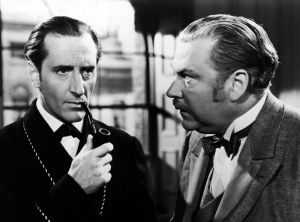
Sherlock Holmes was a favorite of mine growing up. However, the story “A Study in Scarlet” rubbed me the wrong way. I shared Dr. Watson’s shock about Holmes’s lack of knowledge about the world around him. When an incredulous Watson discovered that Holmes wasn’t even aware of the Copernican model of the solar system, Holmes objected he couldn’t be bothered by such facts:
“What the deuce is it to me?” he interrupted impatiently: “you say that we go round the sun. If we went round the moon it would not make a pennyworth of difference to me or to my work.”
Clearly, I decided, Arthur Conan Doyle failed to grasp that an educated, well-rounded individual (as Holmes surely was) had to master the big picture before he could understand the little one.
But this article in Scientific American suggests Arthur Conan Doyle was on to something about the quirky intricacies of the human mind:
Many of the etchings by artist M. C. Escher appeal because they depict scenes that defy logic. …
In 2003 a team of psychologists led by Catya von Károlyi of the University of Wisconsin–Eau Claire made a discovery using such images. When the researchers asked people to pick out impossible figures from similarly drawn illustrations, they found that participants with dyslexia were among the fastest at this task.
Strong readers are necessarily skilled at focusing visual attention. But a trade-off is involved: when focusing on detail, the brain suppresses awareness of its surroundings. Poor readers may be unable to focus attention in this way. They would therefore be more globally aware, which could lead to advantages for performing tasks, such as discriminating impossible figures. (Emphasis mine)
Amazing, isn’t it, how literature captures so much truth about the human condition that we’re just now able to appreciate?
Fascinating Mike, really is, and I love Holmes too.
LikeLiked by 1 person
Doyle’s works remain classics. I’m overdue for a complete re-reading of them! It’s amazing what you see in stories that were beyond you in your younger days.
LikeLike
Yes indeed. Being able to return to these works after growing some, is almost like being exposed to them for the very first time. Like you said, you see things you missed the first time around, or either forgot after so many years. In any case, it feels very comfortable to re-read them.
LikeLike
That is quite an insight into the reading process. Am currently reading a plot book in Spanish. Not my normal taste but think it helps more with sentence structure but it lacks the descriptive detail I prefer. Detective novels can be similar but Conan Doyle managed both! Maybe reading him can strengthen a reader?
LikeLike
navasolanature,
Doyle understood much about the human condition. Peter Falk’s Columbo was one of many successful clones on the brilliant detective who was also a detached, troubled klutz.
Then there’s the (reality-based!) absent-minded professor…
LikeLike
Indeed dear Sherlock liked the opium dens!
LikeLike